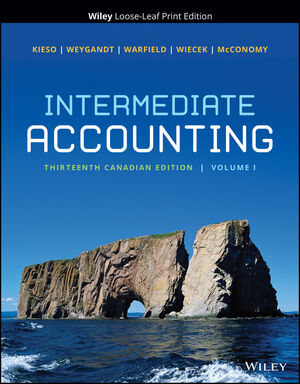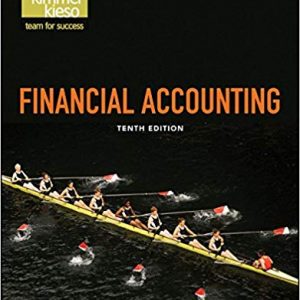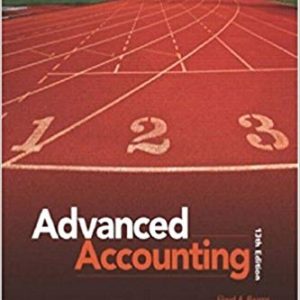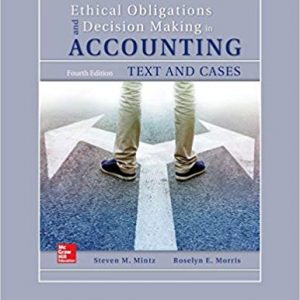No products in the cart.
ACCOUNTING
Intermediate Accounting, Volume 1, 13th Canadian Edition Donald E. Kieso, Jerry J. Weygandt, Terry D. Warfield, Irene M. Wiecek, Bruce J. McConomy Test Bank
Intermediate Accounting, Volume 1, 13th Canadian Edition Donald E. Kieso, Jerry J. Weygandt, Terry D. Warfield, Irene M. Wiecek, Bruce J. McConomy Test Bank
Intermediate Accounting
( Test Bank)
Intermediate Accounting, Volume 1, 13th Canadian Edition Donald E. Kieso, Jerry J. Weygandt, Terry D. Warfield, Irene M. Wiecek, Bruce J. McConomy Test Bank
Edition: Volume 1, 13th Canadian Edition
Author Name: Donald E. Kieso, Jerry J. Weygandt, Terry D. Warfield, Irene M. Wiecek, Bruce J. McConomy
contact:
Whatsapp +1 (949) 734-4773
for the Facebook page click here
for more books for ( Test Bank and Solution Manual) click here
For a Solution Manual click here
sample free
$49.00 $90.00
Intermediate Accounting, Volume 1, 13th Canadian Edition Donald E. Kieso, Jerry J. Weygandt, Terry D. Warfield, Irene M. Wiecek, Bruce J. McConomy Test Bank
Intermediate Accounting
( Test Bank)
Intermediate Accounting, Volume 1, 13th Canadian Edition Donald E. Kieso, Jerry J. Weygandt, Terry D. Warfield, Irene M. Wiecek, Bruce J. McConomy Test Bank
Edition: Volume 1, 13th Canadian Edition
Author Name: Donald E. Kieso, Jerry J. Weygandt, Terry D. Warfield, Irene M. Wiecek, Bruce J. McConomy
contact:
Whatsapp +1 (949) 734-4773
for the Facebook page click here
for more books for ( Test Bank and Solution Manual) click here
For a Solution Manual click here
sample free
CHAPTER 1
THE CANADIAN FINANCIAL REPORTING ENVIRONMENT
CHAPTER STUDY OBJECTIVES
- 1. Understand the financial reporting environment. Accounting provides reliable, relevant, and timely information to managers, investors, and creditors so that resources are allocated to the most efficient enterprises. Accounting also provides measurements of efficiency (profitability) and financial soundness. Investors, creditors, management, securities commissions, stock exchanges, analysts, credit rating agencies, auditors, and standard setters are some of the major stakeholders. Illustration 1-4 explains what is at stake for each one. The objective of financial reporting is to communicate information that is useful to key decision makers such as investors and creditors in making resource allocation decisions (including assessing management stewardship) about the resources and claims to resources of an entity and how these are changing. Ideally, all stakeholders should have access to the same information in order to ensure that good decisions are made in the capital marketplace. (This is known as information symmetry.) However, this is not the case—there is often information asymmetry. Of necessity, management has access to more information so that it can run the company. It must also make sure that it does not give away information that might harm the company, such as in a lawsuit where disclosure might cause the company to lose. Aside from this, information asymmetry exists because of management bias whereby management acts in its own self-interest, such as wanting to maximize management bonuses. This is known as moral hazard in accounting theory. Information asymmetry causes markets to be less efficient. It may cause stock prices to be discounted or costs of capital to increase. In addition, it might detract good companies from raising capital in the particular market where relevant information is not available (referred to as adverse selection in accounting theory). The efficient markets hypothesis is felt to exist only in a semi-strong form, meaning that only publicly available information is assimilated into stock prices.
- Explain the need for accounting standards and identify the major entities that influence standard setting and financial reporting. The accounting profession has tried to develop a set of standards that is generally accepted and universally practised. This is known as GAAP (generally accepted accounting principles). Without this set of standards, each enterprise would have to develop its own standards, and readers of financial statements would have to become familiar with every company’s particular accounting and reporting practices. As a result, it would be almost impossible to prepare statements that could be compared. In addition, accounting standards help deal with the information asymmetry problem.
The Canadian Accounting Standards Board (AcSB) is the main standard-setting body in Canada for private companies, pension plans, and not-for-profit entities. Its mandate comes from the Canada Business Corporations Act and Regulations as well as provincial acts of incorporation. For public companies, GAAP is International Financial Reporting Standards (IFRS) as established by the International Accounting Standards Board (IASB). Public companies are required to follow GAAP in order to access capital markets, which are monitored by provincial securities commissions. The Financial Accounting Standards Board (FASB) is also important as it influences IFRS standard setting. Private companies may choose to follow IFRS. Public companies that list on U.S. stock exchanges may choose to follow U.S. GAAP.
- Explain the meaning of generally accepted accounting principles (GAAP) and the significance of professional judgement in applying GAAP. Generally accepted accounting principles are either principles that have substantial authoritative support, such as the CPA Canada Handbook, or those arrived at through the use of professional judgement and the conceptual framework.
Professional judgement plays an important role in Accounting Standards for Private Enterprises (ASPE) and IFRS since much of GAAP is based on general principles, which need to be interpreted.
- Discuss some of the challenges and opportunities for accounting. Some of the challenges facing accounting are the impact of technology, sustainability reporting, oversight in the capital markets, centrality of ethics, standard setting in a political environment, and principles- versus rules-based standard setting. All of these require the accounting profession to continue to strive for excellence and to understand how accounting adds value in the capital marketplace.







There are no reviews yet.